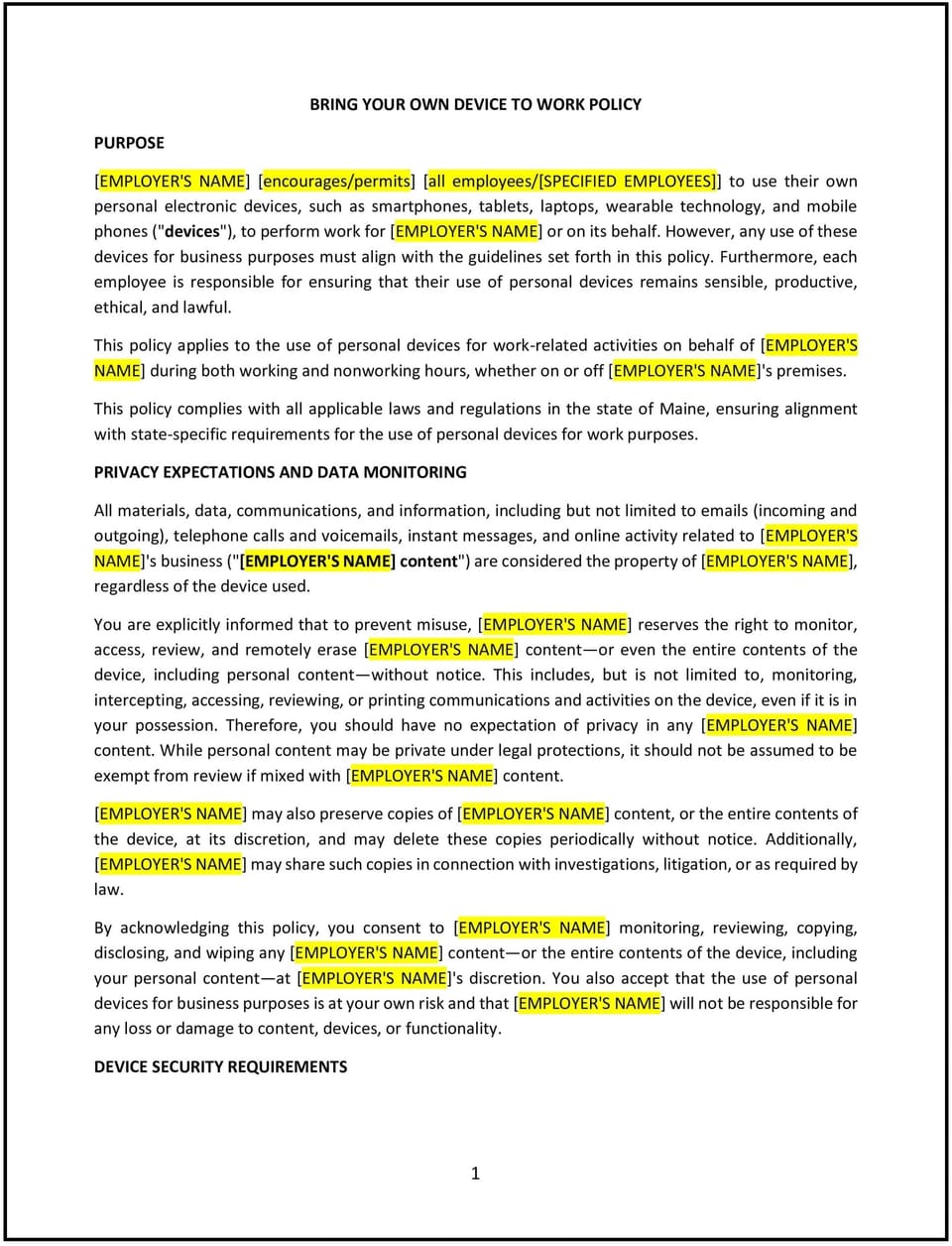Bring your own device to work policy (Maine): Free template

Bring your own device to work policy (Maine): Free template
This bring your own device (BYOD) to work policy is designed to help Maine businesses manage the use of employee-owned devices for work purposes. It provides guidelines to ensure security, productivity, and proper usage while addressing privacy concerns and supporting compliance with applicable laws.
By implementing this policy, Maine businesses can enhance flexibility, reduce technology costs, and maintain a secure work environment.
How to use this bring your own device to work policy (Maine)
- Define allowed devices: Specify which types of devices, such as smartphones, laptops, or tablets, are permitted for work purposes.
- Set security requirements: Outline measures employees must follow to protect business data, such as using passwords, encryption, and antivirus software.
- Address usage guidelines: Include rules for using personal devices for work-related tasks and accessing company resources.
- Clarify ownership and responsibility: State that employees retain ownership of their devices but are responsible for maintaining security and compliance with the policy.
- Establish monitoring protocols: Explain whether and how the business may monitor or access employee devices for work-related purposes.
- Provide support limitations: Detail the level of IT support the business will offer for employee-owned devices.
- Address cost-sharing: Specify whether the business will reimburse employees for device-related expenses, such as data plans or app purchases.
- Regularly review: Update the policy as needed to reflect changes in technology, workplace practices, or Maine laws.
Benefits of using this bring your own device to work policy (Maine)
Implementing this policy provides several benefits for Maine businesses:
- Reduces costs: Lowers technology expenses by allowing employees to use their own devices.
- Enhances flexibility: Enables employees to work more efficiently using familiar devices.
- Improves productivity: Promotes seamless communication and task management through personal devices.
- Ensures data security: Establishes safeguards to protect sensitive business information.
- Promotes clarity: Provides clear expectations for employees using personal devices for work purposes.
Tips for using this bring your own device to work policy (Maine)
- Communicate the policy: Share the policy with employees during onboarding and ensure it is readily available.
- Train employees: Provide guidance on securing devices and using them responsibly for work purposes.
- Monitor compliance: Regularly audit device usage to ensure alignment with security and usage guidelines.
- Offer support: Provide employees with resources or training to configure devices securely and access company systems.
- Balance privacy and security: Respect employee privacy while protecting business data, avoiding excessive monitoring.
- Update regularly: Keep the policy aligned with new technologies, security threats, and legal requirements in Maine.
Q: What devices are typically covered under a BYOD policy?
A: Businesses should specify eligible devices such as smartphones, laptops, and tablets, based on their compatibility with company systems.
Q: How can businesses ensure data security on personal devices?
A: Businesses can require security measures such as strong passwords, encryption, antivirus software, and secure access to company resources.
Q: What responsibilities do employees have under a BYOD policy?
A: Employees are responsible for maintaining device security, following usage guidelines, and reporting lost or stolen devices immediately.
Q: Should businesses reimburse employees for BYOD-related expenses?
A: Businesses may choose to reimburse employees for specific costs, such as additional data usage or required apps, based on the policy.
Q: How can businesses protect employee privacy under a BYOD policy?
A: Businesses should limit monitoring to work-related activities and clearly communicate how employee devices may be accessed or reviewed.
Q: How often should businesses review their BYOD policy?
A: Businesses should review the policy annually or whenever there are updates to Maine laws, security risks, or technology trends.
Q: What IT support should businesses provide for personal devices?
A: Businesses should define the extent of IT support offered, such as assistance with setup, troubleshooting, or securing devices for work use.
This article contains general legal information and does not contain legal advice. Cobrief is not a law firm or a substitute for an attorney or law firm. The law is complex and changes often. For legal advice, please ask a lawyer.


